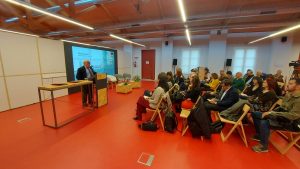- The first challenge aimed at reducing motorcycle-related accidents was presented today at an event organised at Ca L’Alier, where the DGT and Barcelona City Council signed a cooperation agreement towards this objective.
- Starting in January, Barcelona City Council, together with Fira de Barcelona, the DGT and EIT Urban Mobility, will launch the first challenge aimed at reducing motorbike accidents. The winning project will receive €100,000 to subsidise a pilot project for 18 months.
- Barcelona Innova Lab is the first living laboratory established in Barcelona, created by Barcelona City Council, DGT, Fira Barcelona and EIT Urban Mobility.
Barcelona, 20 December 2022 – Last March, Barcelona City Council, Fira Barcelona, EIT Urban Mobility and the Directorate General of Traffic (DGT) formalised an alliance to create Barcelona Innova Lab’s urban mobility laboratory. The recently opened living lab, is one of the instruments to attract innovative solutions related to the mobility sector. Its aim is to attain specific goals for reducing accident rates in general and to incorporate the 0 vision for the year 2050. This instrument, the first living lab set up in Barcelona, reinforces its objective of becoming a natural space for experimentation where innovative products, services and methodologies can be tested to check their usefulness, operation and the generation of public value before being scaled up to products or services that can be implemented and marketed.
Urban challenge: “How to reduce motorcycle-related accidents”.
The founding bodies of the Barcelona Innova Lab have already taken the first step and will launch the urban challenge award in January. The aim of the challenge is to reduce the number of accidents involving motorcycles, thereby increasing road safety in the city for both motorcyclists and other people who travel through the city, whether on foot or in other vehicles. The urban challenge formula is a new way of solving urban problems and complex city needs that require innovative solutions.
The challenge will have a budget allocation of €100,000 in grants, corresponding to a maximum of 80% of the total amount of the proposed solution. Solutions submitted may be aimed at solving the accident rate from either (or both) of the above-mentioned prospects: from behavioural innovation, through a solution that is capable of intervening on the behaviour of the people who use this type of vehicle, or from technological innovation, where the solution will have to prioritise an innovative technological component.
The timeframe for implementation of the winning proposal will be 18 months, of which the pilot phase with monitoring will have to be a minimum of 6 months. The proposal will also include a pilot phase in a real environment to achieve a measurable impact in relation to the safety of drivers, motorcyclists, and third parties in public space.
The following solutions will be pursued:
- An innovative and differential component, using innovative methodologies and resources in terms of planning and implementation.
- High impact, with a demonstrable effect and a measurable and lasting return over time.
- Projects that can be implemented in the short term.
The project should define the deployment space of the driver, either citywide or in a specific type of space.
Collective involvement
The cooperation agreement also underlines the need to involve the various groups related to the world of motorbikes and mopeds through actions in each field by members, users, etc. Always working with the different city councils, society (entities that integrate various groups in the field of mobility, road victims associations, etc.) and companies related to the world of mobility. In addition, the project is also aimed at engaging mutual insurance companies, educational centres, universities and driving school associations.


Laia Bonet, from the Barcelona City Council and Pere Navarro, from DGT sign the agreement
About Barcelona Innova Lab
Last March, Barcelona City Council, Fira Barcelona, EIT Urban Mobility and the Directorate General of Traffic (DGT) formalised an alliance to create Barcelona Innova Lab’s urban mobility laboratory.

The aim is to encourage and facilitate the implementation of innovative projects and pilot tests in smart and sustainable urban mobility.
Through Barcelona Urban Lab, mobility challenges will be defined and projects will be selected that will lead to improvements in this sector. Moreover, selected companies will be offered a public space as a test bench to test their projects in a real environment.
They will also be provided with a new space to develop innovation projects at Fira de Barcelona, advisory services and access to the city council’s sensors and database hub.